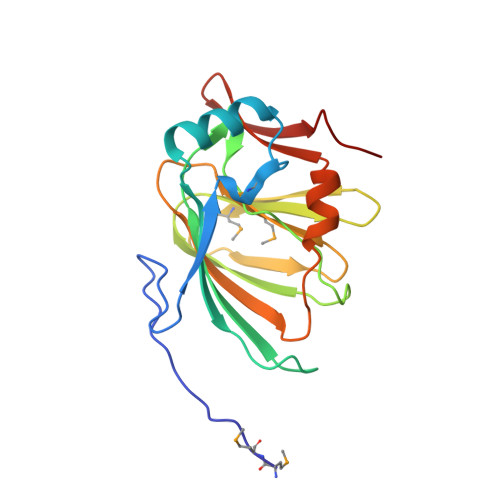The structures of inhibitor complexes of Pyrococcus furiosus phosphoglucose isomerase provide insights into substrate binding and catalysis.
Berrisford, J.M., Akerboom, J., Brouns, S., Sedelnikova, S.E., Turnbull, A.P., van der Oost, J., Salmon, L., Hardre, R., Murray, I.A., Blackburn, G.M., Rice, D.W., Baker, P.J.(2004) J Mol Biol 343: 649-657
- PubMed: 15465052
- DOI: https://doi.org/10.1016/j.jmb.2004.08.061
- Primary Citation of Related Structures:
1X7N, 1X82, 1X8E - PubMed Abstract:
Pyrococcus furiosus phosphoglucose isomerase (PfPGI) is a metal-containing enzyme that catalyses the interconversion of glucose 6-phosphate (G6P) and fructose 6-phosphate (F6P). The recent structure of PfPGI has confirmed the hypothesis that the enzyme belongs to the cupin superfamily and identified the position of the active site. This fold is distinct from the alphabetaalpha sandwich fold commonly seen in phosphoglucose isomerases (PGIs) that are found in bacteria, eukaryotes and some archaea. Whilst the mechanism of the latter family is thought to proceed through a cis-enediol intermediate, analysis of the structure of PfPGI in the presence of inhibitors has led to the suggestion that the mechanism of this enzyme involves the metal-dependent direct transfer of a hydride between C1 and C2 atoms of the substrate. To gain further insight in the reaction mechanism of PfPGI, the structures of the free enzyme and the complexes with the inhibitor, 5-phospho-d-arabinonate (5PAA) in the presence and absence of metal have been determined. Comparison of these structures with those of equivalent complexes of the eukaryotic PGIs reveals similarities at the active site in the disposition of possible catalytic residues. These include the presence of a glutamic acid residue, Glu97 in PfPGI, which occupies the same position relative to the inhibitor as that of the glutamate that is thought to function as the catalytic base in the eukaryal-type PGIs. These similarities suggest that aspects of the catalytic mechanisms of these two structurally unrelated PGIs may be similar and based on an enediol intermediate.
Organizational Affiliation:
The Krebs Institute for Biomolecular Research, Department of Molecular Biology and Biotechnology, University of Sheffield, Firth Court, Western Bank, Sheffield S10 2TN, UK.
















